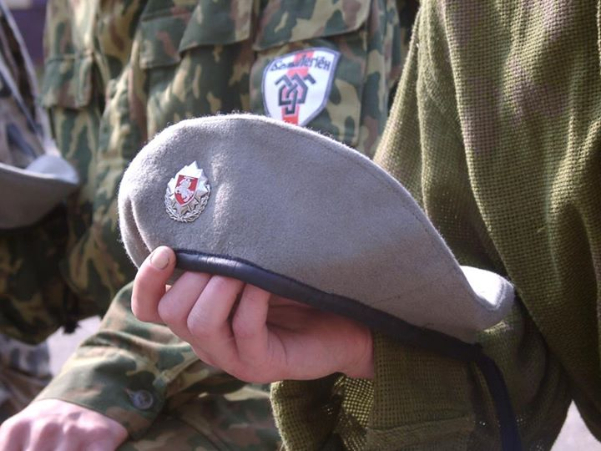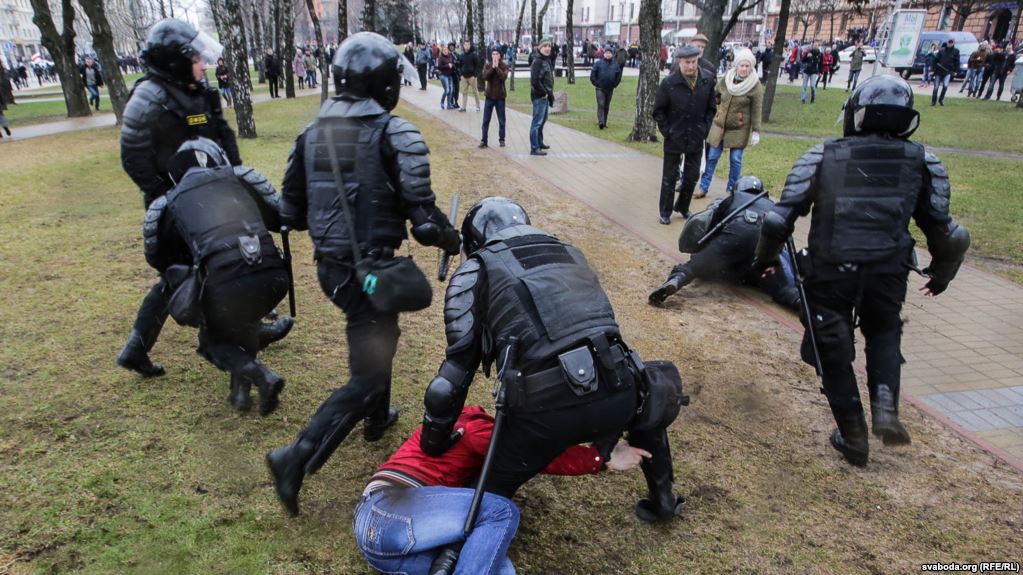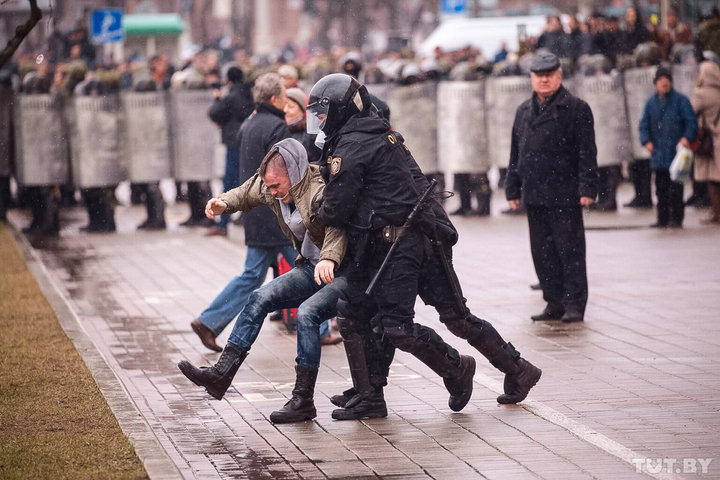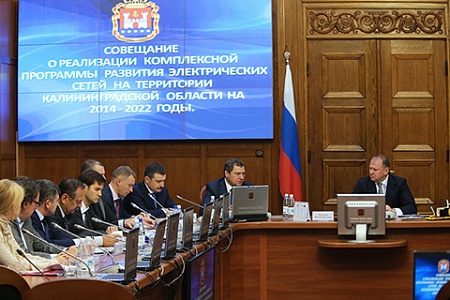On 21 March 2017, the Belarusian authorities began a program of repression against civil society activists, which is still ongoing. These measures followed mass protests of the population against the unpopular economic policies of the government, including the famous decree on 'social parasites'.
The work of the state propaganda machine goes hand in hand with this process. It aims to instil fear into the population with tales of terrorist and nationalist 'threats'. These stories also serve to justify the state's overblown response to the protests, as well as improve the image of law enforcement agencies.
However, the propaganda effort has largely failed. Instead, what became obvious was their plan to increase repression and control over society, as well as the poor quality of state media.
Ukrainian provocateurs
The state media has decided not to target all participants in the social protests, instead blaming the organizers and the independent media. The main message was that 'non-state media misinformed people', acting together with protest organizers, who 'took advantage of people’s discontent in order to achieve their own political goals'.
At the same time, state propagandists brought up the possibility of 'provocations' during mass protests to intimidate its audience. Trying to link the Belarusian opposition with the situation in Ukraine, the state media showed the Ukrainian Maidan as an example of such 'provocations'. Before the mass demonstration on 25 March 2017, Belarusian state television broadcast a report asking: 'Can you be sure that some crazy nationalist or volunteer from Donbas won’t bring weapons or explosives to the protests and use them?'
At first, state propagandists had decided that Belarusian anarchists were responsible for these 'provocations'. Mikalaj Statkievič, who was supposedly their leader, coordinated his activities with a Ukrainian businessman named Alexander Smantser. However, the state media didn’t specify why Ukrainian business should be interested in destabilizing Belarus.
A terrorist threat from Poland
Following President Lukashenka’s statement regarding 'some armed groups near Asipovičy and Babrujsk' on 21 March 2017, the role of 'provocateurs' was passed on to the 'White Legion'. Speaking about those detained in the 'White Legion' case, state propagandists resorted to every possible cliché, including the tried and true fascist, Nazi, anti-Russian, and foreign financing threats, as well as more topical threats of terrorism, Maidan, and the Islamic state.

According to state propaganda, not only was the 'White Legion' planning armed provocations and terrorist attacks in Minsk, it was also working to organize a terrorist attack in Moscow. As one speaker in a Belarusian TV 'documentary' put it: 'The leader of the White legion has announced that in order to prevent Belarus from uniting with Russia, terrorist attacks in Moscow are necessary'. As usual, no evidence was provided The idea was to show that the Belarusian regime is a reliable partner to Russia in security matters, especially given the recent terrorist attack in the Saint-Petersburg metro on 3 April 2017. In this way, the Belarusian authorities are trying to secure financial bonuses from the Kremlin for showing its loyalty and 'protecting' Russia from a 'terrorist threat'.
The state-concocted German-Belarusian informer 'Frau A', whose denunciations were used by state propaganda to prove the 'White Legion’s' involvement, brought up another essential point. She directly stated that Poland and Ukraine had financed and trained the 'provocateurs', who were supposedly planning terrorist attacks in Minsk. Given the fact that state propaganda calls the White Legion Nazis and fascists, the situation becomes even more convoluted. Although Ukraine may be used to such accusations from Russian and Belarusian state propaganda, Poland is not. For the Polish, for whom the fight for independence during WWII is a point of national pride, this is a serious insult.
Breaking the law
It is also important to note that state propaganda has technically broken the law. First of all, the detainees cannot be called guilty until the court reaches a decision. Thus, the media cannot publicly call them 'terrorists', 'Nazis', etc. Secondly, propagandists have ignored the principle of 'investigation privacy' – they have illegally disclosed information on the investigation while it is still ongoing.
What's more, showing pictures of fake weapons as proof of the existence of an illegal armed formation, as the newspaper Belarus Segodnia did, demonstrates a lack of professionalism. The amateurish quality of state propaganda is also evidenced by the TV channel Belarus-1's decision to ask actor Vladimir Gostyukhin and a singer Anatol Jarmolienka to comment on the case of the 'White Legion' in a 'documentary' film.
All state propaganda pieces on the 'White legion', are published anonymously, which demonstrates the state's unwillingness to take responsibility for their falsehoods. As if that wasn't enough, YouTube deleted the most discussed propaganda film, 'White Legion of black souls', by Belarus-1, because it illegally used music from the Belarusian folk-band Irdorath.
Propaganda vs independent media
Finally, the propaganda is constantly disparaging independent and foreign media, accusing them of lying about protests and repressions. As usual, they do not provide any evidence.

The authorities also like to claim that the independent media gets financial support from abroad, meaning they must serve the interests of foreign states and are thus 'traitors'. Given that most people have access to different sources of information besides state-owned TV and newspapers, this argument beggars belief for most Belarusians.
State propaganda also uses other means to disseminate its messages. For example, on 18 April 2017, an Orthodox priest named Fiodar Poŭny, who is believed to be Lukashenka’s confessor, made a public statement during an Easter festival in Minsk insulting tut.by – the most popular online news portal in Belarus. On 8 April 2017, Hienadź Davydźka suggested a complete prohibition of forums and comments on the Internet on his program.
The fall of the Belarusian state media
The state propaganda machine has failed to accomplish its goals. Instead of fearing 'Nazi-terrorists from the "White Legion'”, people are now supporting detainees and their families. The frontman of the famous folk-band Stary, Olsa Dzmitry Sasnoŭski, has started a 'help service' for families of detainees.
The 'White Legion' has become a symbol for the fight against repression from the regime. Instead of supporting repression of the opposition, civil society is accusing law enforcement agencies of fabricating the 'White Legion' story. The lack of professionalism of the state propaganda machine has even become a viral meme on the Internet.
Nevertheless, the propagandists seem to believe that they are still in control of the Belarusian information landscape and seek to moderate it according to their whims. State media repeat the same intimidating messages aimed at improving the image of law enforcement agencies. This is very telling of the authorities’ unwillingness to deescalate the protests and enter into dialogue with the population.




